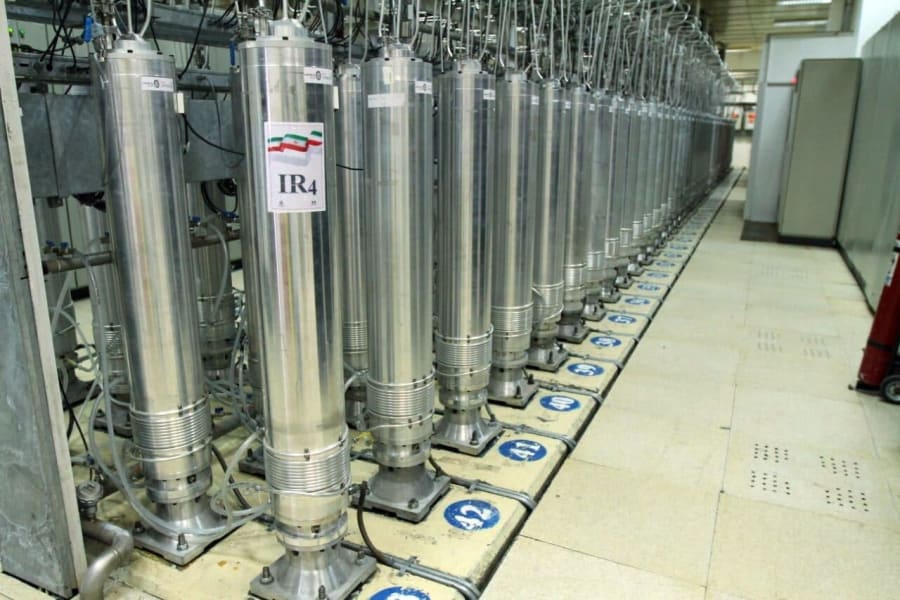UN nuclear watchdog: Iran has enough enriched uranium to make 3 nuclear bombs

The United Nations' International Atomic Energy Agency (IAEA) released a confidential report stating that Iran now has enough sufficiently enriched uranium to produce several nuclear bombs.
Iran has so much uranium enriched to up to 60% purity – close to weapons-grade, which is around 90% – that it could make three nuclear bombs, according to the UN nuclear watchdog's report.
At the same time, the Islamic regime in Tehran continues refusing to cooperate with IAEA inspectors.
Iran's stock of uranium enriched to up to 60% grew by 6.7 kgs (almost 15 lbs) to 128.3 kgs (about 283 lbs) since the IAEA’s last report on Sept. 4. According to the IAEA, roughly 42 kgs (93 lbs) is enough to make a nuclear bomb, if the uranium is enriched further.
According to the report, as of Oct. 28, Iran’s total enriched uranium stockpile was at 4,486.8 kgs (almost 9,900 lbs), an increase of 691.3 kgs (1,524 lbs) since the last report in September 2023. The limit according to the Iran nuclear deal from 2015 was set at 202.8 kgs (about 447 lbs).
An unnamed senior diplomat indicated that there seems little use for such large, enriched amounts of uranium unless it are used to make bombs.
“That's quite an amount, especially if you don't use it for anything,” the diplomat said.
Iran continues to deny that it is seeking to produce nuclear bombs.
In its report, the IAEA noted that Iran’s decision to bar several of its inspectors was “extreme and unjustified,” saying it “directly and seriously affected” the IAEA’s work. The inspectors had their accreditation withdrawn by Iran in September.
“Iran’s stance is not only unprecedented but unambiguously contrary to the cooperation that is required,” the IAEA stated in the confidential report.
“The (IAEA) Director General (Grossi) continues to strongly condemn Iran's sudden withdrawal of the designations of several experienced Agency inspectors,” the report added.
The IAEA also noted in a second confidential report that its request for an explanation from Iran regarding the origin and current location of manmade uranium particles found at two locations not declared by Tehran as potential nuclear sites – Varamin and Turquzabad – had not been fulfilled.
It also noted that monitoring equipment, which had been removed by Iran in June 2022, had still not been reinstalled.
In August, the head of Iran’s Atomic Energy Organization, Mohammed Eslami, said the country would continue its uranium enrichment in accordance with domestic Iranian law.
“Our nuclear enrichment continues based on the strategic framework law,” said Eslami at the time, with a reference to supportive Iranian legislation entitled: “Strategic Action Plan to Lift Sanctions and Protect Iranian Nation’s Interest.” The Iranian parliament passed the bill in December 2020.
“Our enemies were and are against Iran’s nuclear industry, but they all should know that the nuclear industry is a strategic industry,” Eslami stated.
According to Reuters, it is unlikely that Iran’s non-compliance with IAEA demands will have any consequences.
“Despite the standoffs over the inspectors, particles and monitoring equipment, Iran is unlikely to face serious consequences when the IAEA board meets next week,” Reuters wrote.
“While the United States and its European allies have previously threatened to pass another binding resolution against Iran, diplomats say that will not happen this time for reasons including avoiding a diplomatic escalation with Iran while attention is focused on Israel's conflict with Hamas in Gaza.”

The All Israel News Staff is a team of journalists in Israel.














